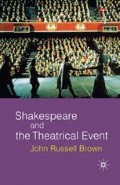Abstract
A performance of a Shakespeare play can never be what it was in his time. Even if the text could be kept exactly as it was written, it would never be acted or received in the same way. With a great deal of trouble, guesswork, and approximation, theatre buildings and stage management could be replicated today but not their original effect: today, they would strike audiences as antiquated and peculiar. This study has shown that a theatrical event depends on factors that will always be subject to change: the occasion of performance, the composition and disposition of its audience, the individuality and talent of each actor, and the conscious and unconscious decisions that actors make before and during the show. Inevitably, every performance will be both old and new, even when it conscientiously tries to repeat the past. The wonder is that Shakespeare’s plays have proved so receptive to change that they continue to be revived and can still draw large audiences after more than 400 years. It seems that the possibility of change has been written into the texts.
Preview
Unable to display preview. Download preview PDF.
Notes
See Peter Clark, The English Alehouse: A Social History, 1200–1830 (London and New York: Longman, 1983).
Copyright information
© 2002 John Russell Brown
About this chapter
Cite this chapter
Brown, J.R. (2002). Time. In: Shakespeare and the Theatrical Event. Palgrave, London. https://doi.org/10.1007/978-0-230-62961-5_13
Download citation
DOI: https://doi.org/10.1007/978-0-230-62961-5_13
Publisher Name: Palgrave, London
Print ISBN: 978-0-333-80132-1
Online ISBN: 978-0-230-62961-5
eBook Packages: Palgrave Literature & Performing Arts CollectionLiterature, Cultural and Media Studies (R0)

